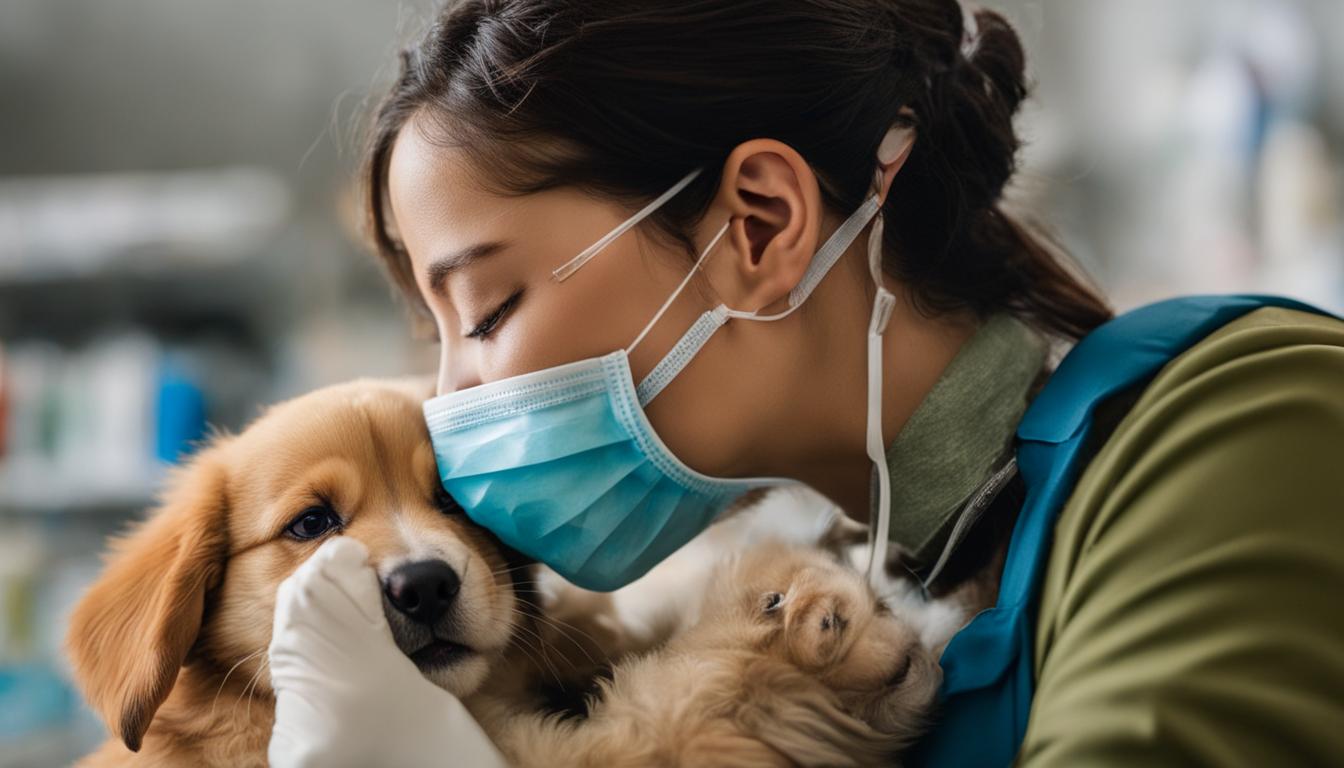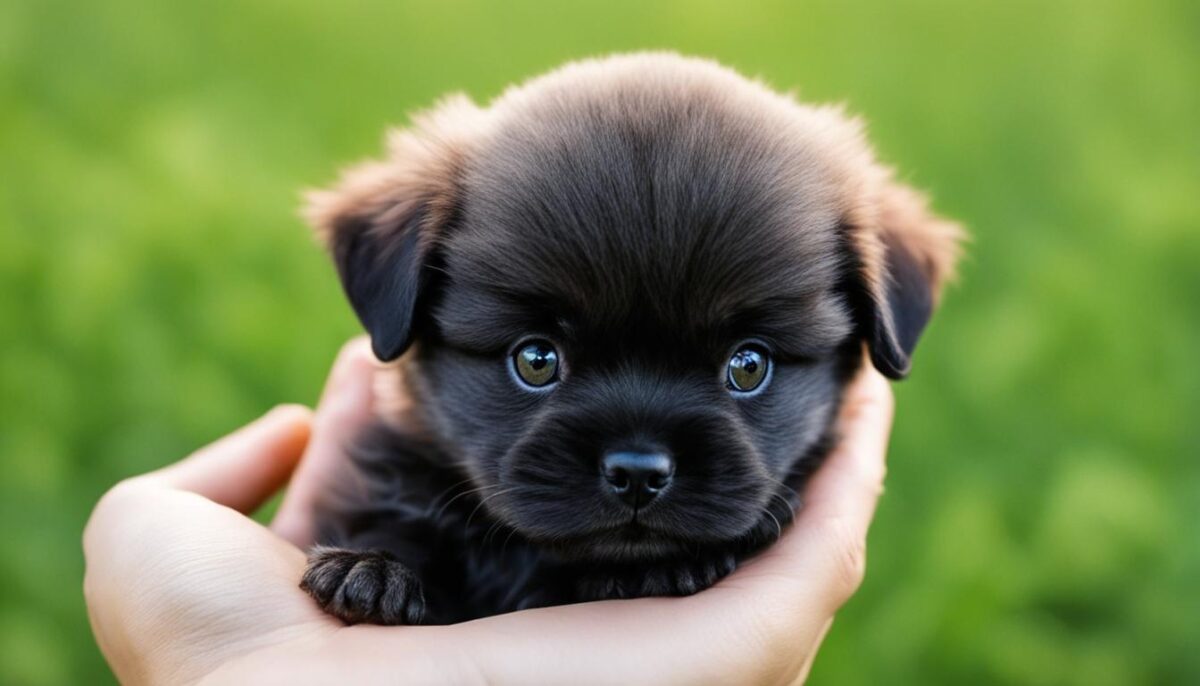When you’ve got a little furry friend with worms, you might wonder if you can still play with them and show them love. Good news! You can still hug and cuddle your puppy, even if they have worms. Dr. Jerry Klein lets us know that keeping clean is key. Wash your hands after you pet your puppy and take them to the vet right away. By doing this, you help keep your puppy and everyone safe and happy.
Key Takeaways
- It’s usually OK to play with a puppy that has worms, as long as you stay clean.
- Wash your hands often when you’re around puppies, especially if they have a worm problem.
- Worms can be a big health issue for puppies, but a vet can help make them all better.
- Some worms can spread to people, so cleaning up after your puppy is super important.
- Visiting the vet right away means your puppy can get well soon and grow up healthy.
The Risks of Worm Infestation in Puppies
When you get a new puppy, it’s important to think about their health. Just like kids, puppies can get sick too. One common illness in puppies is having worms. These intestinal parasites can make puppies feel unwell and cause some serious canine health concerns if not treated. Let’s learn what to watch for and how to keep everyone safe.
Understanding Intestinal Worms and Their Health Implications
Worms living inside puppies’ tummies can be a big problem. Puppies can get different kinds of worms, like roundworms, hookworms, and others. If a puppy has worms, it might get a tummy ache, feel tired, or look like it’s not eating well. Very bad worm problems can even make it hard for puppies to breathe or eat properly.
Signs Your Puppy May Have Worms
It’s good to know what signs might tell you if your puppy has worms. If you see your puppy with a pot-bellied look, having puppy diarrhea, or vomit, these can all be signs. Puppies with worms might not want to eat and can lose weight. Bad cases might even make puppies throw up or have blood in their poop. If you see any of these symptoms of worms in dogs, you should tell an adult right away.
How Worms Can Spread to Humans and Other Pets
Did you know that some puppy worms can spread to people and other pets? It’s true! When puppies have worms, little eggs can be found in their poop. If people touch the poop or soil where the poop was, they might accidentally pick up these eggs. This is why cleaning up after puppies is very important. It helps prevent pet-to-human infections and keeps everyone, including your furry friend, healthy.
Remember: Keeping clean, picking up after your puppy, and visiting the vet can stop worms from being a big problem. This way, you, your puppy, and everyone around will stay happy and healthy.
Types of Worms Common in Puppies
Puppies are cute, right? But sometimes, they can get sick with worms. These worms are not the friendly kind that you see in the garden. Let’s learn about different types of canine worms that could be bothering our furry friends.
Identifying Different Worms: Rounds, Hooks, Whips, and More
There are a few types of worms that might make a puppy feel icky. The most common ones are called roundworms and hookworms. Puppies might also get tapeworms or whipworms. Let’s see how to tell them apart.
Roundworms look like spaghetti, and puppies can get them in their tummies. Tapeworms are tricky; they break into small pieces that look like rice grains. Hookworms are tiny vampires that suck blood and make puppies weak. Lastly, whipworms whip around the intestines but they are not fun at all!
How Puppies Contract Various Worm Types
How do puppies get these worms? Sometimes from their mommies, which is what we call maternal transmission of worms. They can also get them from playing in the dirt or eating something yucky outside. This is environmental exposure to parasites. Puppies can even get worms by nibbling on fleas that sneaked onto their fur. Yuck!
Want to know more? Have a look at this table below. It shows which worm does what and how puppies can get them. It’s important to make sure puppies go to the vet to make sure they’re healthy!
| Worm Type | What it Does | How Puppies Get It |
|---|---|---|
| Roundworms | Live in the tummy and can cause a tummy ache | From mommy or the environment |
| Tapeworms | Stick to the intestines and make puppies lose weight | From fleas or eating small animals with worms |
| Hookworms | They drink blood and can make puppies very tired | From the soil or through the skin |
| Whipworms | Live in the intestines and can be very painful | From ingesting something contaminated |
Remember, if you have a puppy, it is important to keep them clean and get them checked by a vet. That will keep them wagging their tails with joy, instead of scratching from the itch of worms!
Can I Touch My Puppy If He Has Worms
When you love your little furry friend, it’s normal to want to cuddle and play. If your puppy has worms, you might worry. Good news! You can still touch and love your puppy. Handling puppies with worms is okay if you follow some hygiene practices.
Worms are yucky, but they don’t have to stop you from giving your puppy a gentle pat. When you play with your puppy, just remember to wash your hands with soap and water right after. This is very important because it keeps you safe from the tiny worm eggs that could be on your puppy’s fur.
It’s also smart to keep puppies away from where they potty. Worm eggs can be in the poop, and we don’t want those eggs to spread. If you must clean up after your pup, wear gloves and wash up well afterward.
- Always wash your hands after touching your puppy.
- Try not to touch your face until your hands are clean.
- Keep your puppy’s bedding clean and wash it often.
- When you scoop poop, wear gloves and throw it away quickly.
If you’re still a bit worried, talk to your vet. They’re like a doctor for animals and they know so much about physical contact with infected puppies. They can teach you the best ways to play with and care for your puppy while they have worms.
Remember, being clean is the key! When you touch your puppy, be sure to tidy up yourself and the space around you. Then, you can return to the fun and games with your happy, tail-wagging buddy!
Diagnosis and Treatment of Worms in Young Dogs
Have you noticed something strange about your puppy’s health? It might be worms, and identifying puppy worms is the first step to getting your furry friend back to being healthy and happy. A vet usually runs a stool test to find any worm eggs or pieces of these pesky parasites. Sometimes, you can even see small signs near your puppy’s tail!
Once the vet figures out it’s worms, they’ll pick the right deworming medication to help your puppy get better. This medicine is very good at making the worms go away, but it’s super important to follow the vet’s directions carefully. If the vet says your puppy needs the medicine more than once, it’s because they want to make sure all the worms are gone for good.
Remember, the right vet care is a big deal when treating worms in puppies. Here’s a simple table to help you understand the process better!
| Step in Process | Action | Importance |
|---|---|---|
| 1. Spotting the Problem | Watching for signs like tiredness, a sad belly, or bits near the tail | Catching worms early helps your puppy get better quicker |
| 2. Confirming with Tests | Visiting the vet for a stool test | Tests tell the vet exactly what type of worm is bothering your puppy |
| 3. Treating with Medicine | Giving your puppy the right deworming medicine | The medicine makes the worms leave so your puppy can be healthy |
| 4. Following Up | Going back to the vet, if needed | Some worms are sneaky and need more medicine to make sure they’re all gone |
Just like you, your puppy deserves to feel fantastic all the time. If you think worms might be making your puppy sick, take them to the vet for some help. They know just what to do, and with the right treatment, your puppy will be back to playing and having fun in no time!
Prevention and Control: Keeping Your Puppy Worm-Free
Have you ever worried about worms in your puppy? There are easy ways to stop these sneaky parasites from making your furry friend sick. First, make sure their home is always clean. Pick up their poop right away to stop worm eggs from spreading. You can also give your puppy special medicine to stop heartworms and other belly worms. And remember, raw foods might have worms, so it’s better to avoid them.
Effective Strategies for Preventing Worm Infestations
Kids, if you love playing with your puppy, let’s learn how to keep them safe from worms. Making sure they don’t eat anything weird outside is one great trick. And what about those tiny bugs that jump? Yes, fleas! They can carry worms too. So, let’s make sure our puppy has the medicine it needs to keep fleas away. If you see a wild animal, remember to keep your puppy back, because wild friends might have worms too.
Importance of Regular Veterinary Check-Ups and Fecal Tests
Your puppy needs a doctor just like you do. Taking them for check-ups is a big part of worm prevention in puppies. The vet will do a fecal test to see if any worms are hiding in your puppy. It’s like a secret mission to find invisible worms! Do this a few times in the first year to catch those sneaky worms early.
| Prevention Method | How It Helps | How Often Should You Do It? |
|---|---|---|
| Environmental Cleanliness | Stops worms from spreading | Every day |
| Regular Deworming Meds | Controls internal worms | As prescribed by the vet |
| Veterinary Exams for Worms | Checks for hidden worms | Check-ups every 3-4 months |
| Fecal Tests for Puppies | Finds worms you can’t see | Multiple times in the first year |
| Good Flea Control | Stops worms from fleas | Regularly as recommended |
So, kids, let’s keep an eye on our puppy friends and make sure they stay healthy and happy without any worms. Remember, if your puppy acts tired or sick, tell an adult so they can get the care they need!
Conclusion
When your furry friend has worms, knowing what to do is super important for keeping both of you happy and healthy. You’ve learned that with a bit of know-how, like spotting when something’s wrong and having top-notch cleanliness, you can still play with your puppy even when they have worms. It’s all about being smart and staying clean to make sure those pesky worms don’t spread around.
Taking care of your puppy’s health means being on top of deworming practices, which gets rid of those uninvited worm guests. With regular check-ups at the vet and keeping your eyes peeled for signs of worms, you can nip any problems in the bud fast. Vets are like puzzle solvers for puppy problems, and they’ll guide you on how to treat and prevent worms, so your puppy stays wagging its tail and living its best life.
Remember, being careful is key! Even with worms, your puppy still needs your love and cuddles. Just wash up well after playing together, and keep their home clean. You’re the champion of your puppy’s health, so stick with these tips to keep the fun rolling and the worms at bay. Here’s to many joyful, worm-free days with your puppy!
FAQ
Is it safe to handle my puppy if they have worms?
Yes, it’s safe to touch your puppy even if they have worms, as long as you practice good hygiene, like washing your hands after handling them. It’s crucial to avoid direct contact with the puppy’s stool and maintain cleanliness to prevent the spread of worms.
What health risks do worms pose to puppies?
Worms can cause a variety of health issues in puppies, including diarrhea, weight loss, lethargy, and poor coat appearance. Serious health problems can arise if infestations are left untreated, such as nutritional deficiencies, anemia, organ damage, and even life-threatening complications.
What are some signs that my puppy may have worms?
You should watch for symptoms such as diarrhea, a pot-bellied appearance, abdominal pain, vomiting, nutritional deficiencies, blood in the stool, poor growth in young puppies, and respiratory difficulty in cases of heartworm.
Can worms from my puppy spread to humans?
Yes, certain types of worms, like roundworms and hookworms, can be transmitted from dogs to humans. This usually happens through inadvertent ingestion of worm eggs present in contaminated soil or a dog’s stool. It’s essential to thoroughly clean up after your puppy to reduce this risk.
What types of worms are common in puppies, and how are they different?
Common worms in puppies include roundworms, tapeworms, hookworms, and whipworms. Roundworms are often contracted from the environment or the mother’s milk, while tapeworms come from ingesting infected fleas. Hookworms are blood-feeding parasites that cause anemia, and whipworms live in the intestines and can lead to severe illness if untreated.
How can my puppy contract worms?
Puppies can contract worms via several routes: ingesting worm eggs from the environment, from their mother’s milk, by eating fleas or small animals that carry the parasites, or even before birth while still in the womb. Regular vet checkups are crucial for early detection and treatment.
How are worms diagnosed and treated in puppies?
Worms are typically diagnosed with a stool test which identifies the eggs or segments of the parasites. Your vet may prescribe a course of deworming medication depending on the type of worm, which usually includes repeated doses to fully eradicate the infection.
What are some effective strategies for preventing worm infestations in puppies?
Keeping your puppy’s living environment clean, promptly removing feces, avoiding raw diets, being cautious of wildlife interactions, maintaining good flea control, and regular deworming medications are all key strategies for preventing worm infestations in puppies.
Why are regular veterinary check-ups and fecal tests important for my puppy?
Regular vet visits and fecal tests are vital for early detection and timely treatment of worms. Puppies should have their stool tested several times during their first year, which helps in ensuring they grow up healthy and worm-free.


